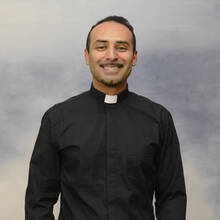Comprehending the Holy Trinity as relationship
Three major solemnities fall back-to-back-to-back over the next three Sundays. These include the celebrations of the Most Holy Trinity, the Most Holy Body and Blood of Christ (Corpus Christi) and the Solemnity of Saints Peter and Paul. This Sunday’s readings in no way explain fully the mystery of the blessed Trinity. What they accomplish, however, like all the solemnities this month, is to investigate some deeper truth about the nature of God. It remains helpful to consider how the nature of humankind reflects that divine image.
“When there were no depths I was brought forth, when there were no fountains or springs of water” (Prv 8:24).
How have you participated in God’s creative act that happens at every moment?
How can understanding of the trinitarian nature of God deepen your faith?
What does the Holy Trinity have to teach our postsecular culture today?
Both the Gospel and Paul’s Letter to the Romans this Sunday speak of a trinitarian nature of God without actually explaining the nature of this relationship. Jesus talked about the Spirit and the Father without distinction in the same utterance. Jesus says of the Spirit, “He will not speak on his own, but he will speak what he hears,” (Jn 16:13). Then without clear transition, Jesus declares, “He will glorify me” (Jn 16:14). The subject “he” could be in reference to either the Spirit of truth or the Father and this remains ambiguous, indicating no easy separation of the persons. At the end of this passage Jesus says, “Everything that the Father has is mine” (Jn 16:15). The passage suggests the presence of a Trinity, but does not give the nature of that relationship much explanation.
Paul does something similar in this Sunday’s second reading from Romans. From where does peace spring? Paul provides an answer, “We have peace with God through our Lord Jesus Christ” (Rom 5:1). Simple enough, but from where does love originate? Paul gave another answer without any conflict, “Because the love of God has been poured out into our hearts through the Holy Spirit” (Rom 5:5). In five short verses, the Apostle Paul provided three distinct “persons” as the one “source” for peace and love without much distinction. Peace and love originate in God and come to us through the Son and the Spirit. Paul speaks intuitively of a triune God, and though he gives that concept no explanation, he appears confident that the first Christians will understand his reasoning.
This Sunday’s psalm and first reading highlight a different aspect of the nature of God, the role of divine creator. These two readings present the divine creative act with participation from the “son of man” and personified Wisdom. Today’s psalm provides a moment of wondrous contemplation for God who sets the moon and stars in their place as “the work of your fingers.” Interrupting this train of thought, “What is man… or the son of man that you should care for him?” (Ps 8:5). This “son of man” is both a reference to humanity’s participation in caring for creation and also for Christians an allusion to the anointed one at whose feet God may “put all things” (Ps 8:7). Paul will reference this same verse for Christ later in his writings (1 Cor 15:27). Wisdom, according to Proverbs in the first reading, also participated in creation. “I was there,” says Wisdom, “when the Lord established the heavens” (Prv 8:27). Both the son of man and wisdom relate dynamically to God’s creative act.
Implications of God’s trinitarian nature appear throughout this Sunday’s readings. How the three persons relate to each other is not articulated in detail except for the repeated notion that they are intimately connected through action. What this Sunday’s readings emphasize, however, is that the divine nature is a relationship at all times without exception. There is no “solitary” divine being; God is a community of three persons. Humanity, created in God’s image, bears the same nature. No persons of faith exist in isolation, and every individual being lives in relationship to others.








